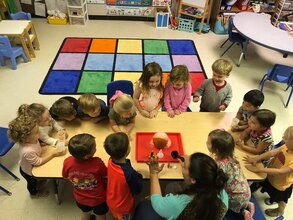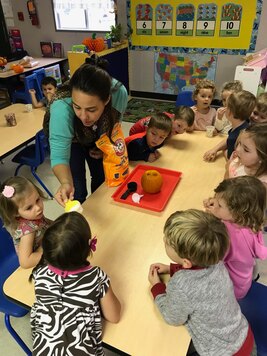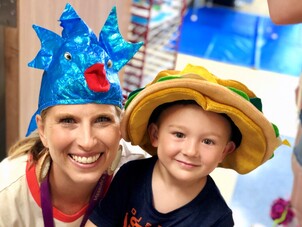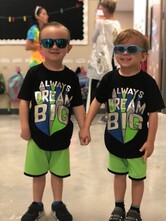Teaching The Basics
3 Day (Tuesday through Thursday) or 4 Day (Monday through Thursday)
Ages 3 & 1/2 to 4 (potty trained)
Ages 3 & 1/2 to 4 (potty trained)

Our Curriculum:
Messiah’s Kids! implements the High Scope preschool curriculum for active participatory learning endorsed by the National Association for the Education of Young Children. (NAEYC) Based on research in child development our curriculum includes: Materials, Manipulation, Choice, Child language and Adult Scaffolding (support). Learning Without Tears is our curriculum extension that includes Math, Readiness, Writing, and Language. Another key component of our day includes the “One In Christ” curriculum for faith nurture developed for The Lutheran Church-Missouri Synod preschools.
Our curriculum is designed to:
Messiah’s Kids! implements the High Scope preschool curriculum for active participatory learning endorsed by the National Association for the Education of Young Children. (NAEYC) Based on research in child development our curriculum includes: Materials, Manipulation, Choice, Child language and Adult Scaffolding (support). Learning Without Tears is our curriculum extension that includes Math, Readiness, Writing, and Language. Another key component of our day includes the “One In Christ” curriculum for faith nurture developed for The Lutheran Church-Missouri Synod preschools.
Our curriculum is designed to:
- Help each child develop a positive view of themselves as children loved unconditionally by God.
- Assure children of their eternal life through faith in Jesus as their Savior.
- Develop safe and healthy habits in young children with an emphasis on proper hygiene, sound nutrition, exercise and physical care.
- Provide opportunities for creative expression.
- Encourage the use of multiple intelligences as defined by Howard Gardner.
- Support the development of social skills such as sharing, cooperation, generosity and empathy.
- Stimulate cognitive problem-solving skills with an emphasis on the concepts of cause and effect, classification, serialization, space, time, numbers, shape, and colors.
- Strengthen communication skills necessary for listening, reading, writing, and speaking by providing an environment rich in the practical use of words.
- Enhance fine-motor and gross-motor skills.
- Reinforce Christian principles of sharing, caring and loving.
- Teach manners and respect for adults and peers.
- Expose children to different ethnic cultures.

The daily High Scope Routine provides for a balance between child-directed and teacher directed activities, quiet and active time, and inside and outside play. Children have daily opportunities to read books, use a variety of art media, and explore math and science materials, and engage in music & movement experiences. Children’s progress is assessed by teacher observation, anecdotal reporting and developmental checklists encompassed in a portfolio system. Parent-Teacher conferences are held at least annually. Daily informal conversations take place at drop-off and pick-up time and appointments are welcomed at any time. The following illustrates examples of Messiah’s Kids Preschool basic High Scope learning centers to be used during “Work Time.” Teachers will add to interest areas with each monthly or weekly theme. Environments that foster active learning require thoughtful planning. Careful attention to the room arrangement, types of materials provided, and storage of those materials help children follow through on their ideas and build on their learning experiences then make individual work plans accordingly.
Book/Puppet Center – This center will encourage an interest in “reading” picture books and children’s literature. The atmosphere here will be quiet, comfortable and allow for learning sight words or reading according to each child’s developmental stage. This center will also include the retelling of stories through puppets.
Manipulative/Math Center – Materials in this center will aid in the development of concept formation, fine motor skills, eye-hand coordination, patterning, sequencing, grouping, counting, sorting and independent work.
In High Scope classrooms, children acquire math skills and concepts through adult-guided experiences that respect children’s concrete thinking and need to learn through exploration. The activities build on children’s natural interests and offer children the time and freedom to construct and reflect on math and science ideas.
Math – Number words and symbols Counting Part-whole relationships Shapes Spatial awareness Measuring Patterns Data analysis.
Block Center – Motor control, visual discrimination, dramatic play, creativity, and language skills are developed by building structures with blocks. Photos will be taken of block structures and placed in children’s’ portfolios.
Science Center – This center will change throughout the year and may include objects in God’s world to be observed, experiments and sand/water table exploration with a variety of media. Young children are experimenters and testers from birth. If we observe young children as they explore their world, we will see them using the following processes: Observing, Classifying, Experimenting, Predicting, Drawing Conclusions, & Communicating Ideas. We call these processes the preschool scientific method because they are the early forms of abilities adult scientists use. How do preschoolers “do science”? Like adult scientists, preschoolers wonder how things work and what makes things happen. They are intent on exploring the properties of the living and nonliving things they encounter in their daily lives. Preschool scientists, are eager to communicate about their discoveries and share their explanations. They do so using their emerging skills in language, literacy, math, and representation.
Expressive Art Center – This center allows for creative expression in conjunction with the development of fine motor skills, eye-hand coordination and experimentation with color, shape, texture, and more.
Drama / Home living Center – The Drama / Home living center is an area for dramatic play and role-play of family, community and church helpers.
Writing Center – This center will provide the child with opportunities to participate in nonverbal communication, dictation of ideas and feelings, reading readiness, and language development. Children will be encouraged to “write” letters, words and stories according to their developmental stage.
Book/Puppet Center – This center will encourage an interest in “reading” picture books and children’s literature. The atmosphere here will be quiet, comfortable and allow for learning sight words or reading according to each child’s developmental stage. This center will also include the retelling of stories through puppets.
Manipulative/Math Center – Materials in this center will aid in the development of concept formation, fine motor skills, eye-hand coordination, patterning, sequencing, grouping, counting, sorting and independent work.
In High Scope classrooms, children acquire math skills and concepts through adult-guided experiences that respect children’s concrete thinking and need to learn through exploration. The activities build on children’s natural interests and offer children the time and freedom to construct and reflect on math and science ideas.
Math – Number words and symbols Counting Part-whole relationships Shapes Spatial awareness Measuring Patterns Data analysis.
Block Center – Motor control, visual discrimination, dramatic play, creativity, and language skills are developed by building structures with blocks. Photos will be taken of block structures and placed in children’s’ portfolios.
Science Center – This center will change throughout the year and may include objects in God’s world to be observed, experiments and sand/water table exploration with a variety of media. Young children are experimenters and testers from birth. If we observe young children as they explore their world, we will see them using the following processes: Observing, Classifying, Experimenting, Predicting, Drawing Conclusions, & Communicating Ideas. We call these processes the preschool scientific method because they are the early forms of abilities adult scientists use. How do preschoolers “do science”? Like adult scientists, preschoolers wonder how things work and what makes things happen. They are intent on exploring the properties of the living and nonliving things they encounter in their daily lives. Preschool scientists, are eager to communicate about their discoveries and share their explanations. They do so using their emerging skills in language, literacy, math, and representation.
Expressive Art Center – This center allows for creative expression in conjunction with the development of fine motor skills, eye-hand coordination and experimentation with color, shape, texture, and more.
Drama / Home living Center – The Drama / Home living center is an area for dramatic play and role-play of family, community and church helpers.
Writing Center – This center will provide the child with opportunities to participate in nonverbal communication, dictation of ideas and feelings, reading readiness, and language development. Children will be encouraged to “write” letters, words and stories according to their developmental stage.

Literacy begins in infancy – Learning to read and write is a developmental process that begins at birth and builds on children’s basic need to communicate. This principle is at the core of the High Scope early literacy program. In High Scope classrooms and centers, children develop literacy skills by engaging in meaningful reading and writing experiences, and they become readers and writers through a unique combination of child-initiated learning and teacher-guided instruction. Learning Without Tears “Get Set for School” is a curriculum that includes three complete programs designed to prepare children for school: Readiness & Writing, Language & Literacy, and Numbers & Math. The developmentally appropriate programs complement and expand our existing Highscope Pre-K program. Each classroom uses Learning Without Tears’ proven strategies:
Readiness & Writing:
Numbers & Math:
- Multisensory approach that addresses different learning styles
- Developmental progression that builds on what children already know
- Friendly voice that connects with children
- Engaging lessons that invite active participation
Readiness & Writing:
- This program incorporates child-friendly teaching strategies, such as using music and movement to bring lessons to life, and multi sensory manipulatives to build fine and gross motor skills. Our readiness and writing lessons teach body awareness, cooperation, taking turns, listening, crayon grip, drawing, building, letter and number recognition, capital letter and number formation.
- Physical development and social/behavioral skills are particularly important in Pre-K. In fact, children need to develop both fine and gross motor skills to be able to write. All these skills are critical to good emotional and social development and future academic performance.
- Addresses children’s diverse learning styles for school readiness and pre-writing. Teaches activities easily that address general readiness, alphabet knowledge, letter/number recognition and formation, counting, drawing, shapes, and colors.
Numbers & Math:
- We demystify numbers and make math concepts relevant and fun for children. With playful manipulatives, music, and rhymes, our numbers and math program teaches counting, comparisons, spatial awareness, patterning, sequencing, matching, sorting, problem solving, and even Pre-K geometry skills.
- The program helps students build number sense right from the start. They also get time to play with real objects and test their ideas so that math becomes real and meaningful. Children also develop oral language that helps them learn about and express math concepts.

Language & Literacy:
*Extended care options are available at an additional charge.
- Children begin developing language skills from the moment they are born. Our language and literacy program actively teaches syllables, names and sounds of letters, words linked to content, new words in spoken language, how to respond to simple questions, and how to have discussions and share ideas.
- The program focuses on building rich Vocabulary so that children learn a word’s meaning and what a word represents so they begin to understand the network of concepts that goes with it. Children also learn the difference between drawing and writing, associate books with reading, ‘read’ environmental print, and ultimately learn the many benefits of early reading and writing.
- Children also learn to identify letter symbols, both capital and lowercase, by letter names. They learn how these "symbols" work together to form printed words and how printed words related to spoken language.
*Extended care options are available at an additional charge.
"Let the children come to me; do not hinder them, for to such belongs the kingdom of God."
~ Mark 10:13-15 ESV
~ Mark 10:13-15 ESV
Website by Web Relevant.

